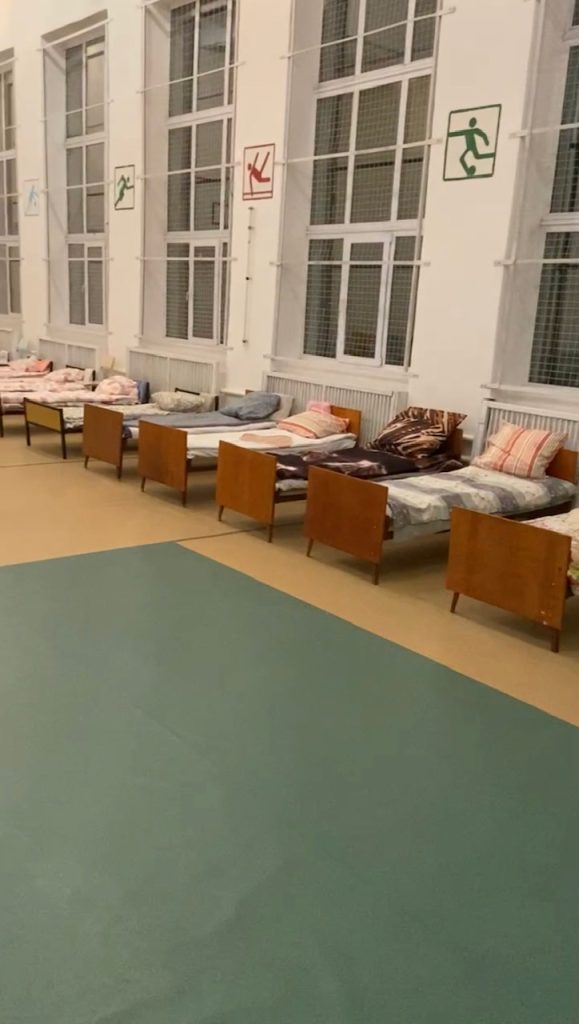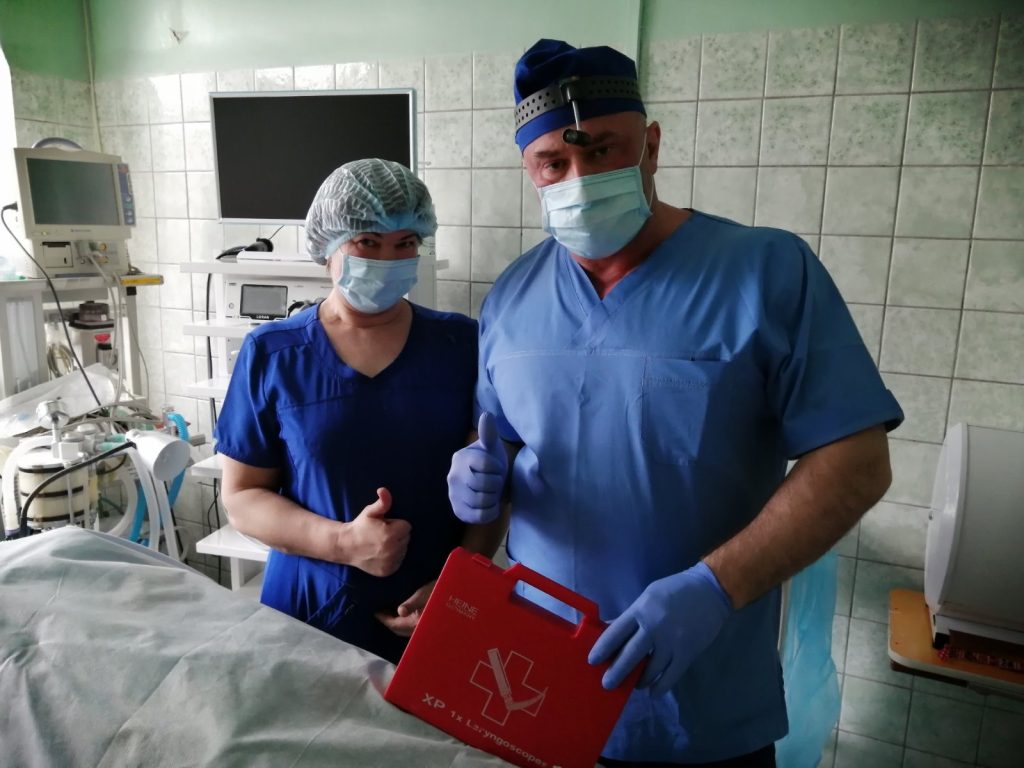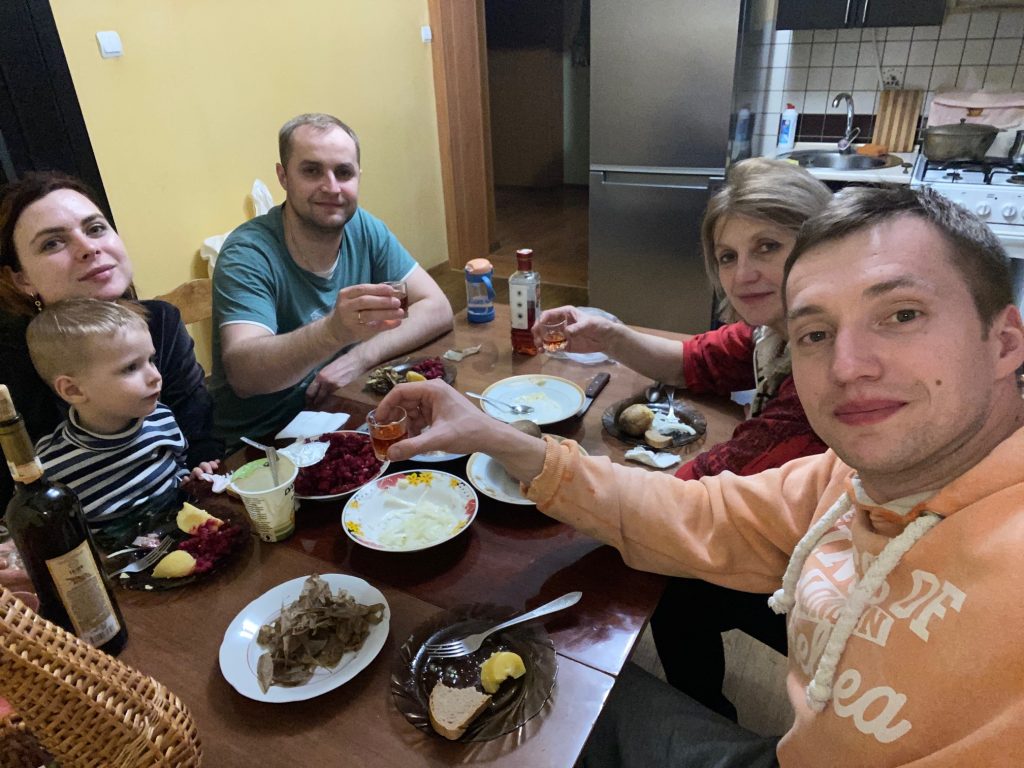A Zoom call to Kyiv

Igor Tokarchuk was an MD-PhD student at the University of Bern. When he and his family returned home to Ukraine and Igor started a job at a biotech company, the future looked bright. Then the war changed everything. He talks to Lenka Fehrenbach, international program manager at UniBE International, about coping with the strains of war and how setting up the refugee camp led to reviving an old bread factory.
“That’s how we live now in Kyiv.” Igor holds his smartphone into the computer camera. The screen shows red and green dots, marking the beginning and end of air alerts. Thirty minutes ago, an alarm went off, but the app informed him that the drone had been repelled. This is why Igor sits next to the window during our zoom call. Usually he would not do this; he would make sure to have at least two walls between him and the outer world. “Just to be safe.”
After what happened and still happens in Ukraine, it’s a relief to see Igor healthy, smiling on my screen. Last September Igor Tokarchuk (31 years) defended his PhD thesis at the University of Bern. He was part of a cohort of 14 international PhD students, who studied in Bern from 2017 to 2021. After finishing his studies, he became a father, returned with his family to Kyiv and started a new job in a recently founded small biotech company. “Everything looked wonderful, but with the beginning of the war the whole mess started,” he continues.

Under attack
Igor talks in a calm and thoughtful way and recounts how he and his family left Kyiv, which was under attack. How they moved to his mother’s place in the west of Ukraine and how he helped to set up a refugee camp in Shumsk. The number of 5,000 inhabitants of the city tripled within the next weeks as more and more refugees flooded in from other parts of the country. Igor helped to organize the camp, to provide housing in the local school and with locals. They organized registration, security, food and medical support.
“But we realized just supplying people with all the necessities was not enough. People needed something to do. There was an abandoned, quite rusty bread factory. We were so happy to see that some people said, we are going to rebuild this bread factory. And they did it.” I can feel that Igor is really touched by this and how proud he is of them. “Until today they are producing and selling bread. They are not living a normal life but a life where they are needed.”
Igor tells the story of an 80-year-old woman from the Eastern part of Ukraine, where the majority of the population speaks Russian. In the refugee camp, she attended a Ukrainian language course and “was amazed that her tongue really was able to pronounce sentences in Ukrainian.” Or the one from a 10-year-old girl who lost contact with her brother, who is a soldier in the army. In her desperation, she took her dog and ran off into the forest. For two days nobody knew where she was. Everybody was looking for her, until someone found her by chance, sitting in the forest. Back then, she felt really lonely and depressed. “But when I left Shumsk she was baking pizza in the bread factory and was really smiley.”
“Please don’t think of us only as victims”
Igor Tokarchuk
Help from former colleagues and friends

“Please don’t think of us only as victims. We share the same values and also a lot of history,” says Igor, referring to the Second World War and thinking about destroyed villages and cities. “It is just a pity that it can happen again in 2022.” The support he receives from former colleagues and friends in Switzerland is very important to him. A lot of people were also financially contributing to the refugee camp and supporting medical care. One person who is still very actively involved in providing help is Professor Mario Tschan and his research group from the Institute of Pathology of the University of Bern. “Right now, he took up the negotiations with companies, pharmacy stores, etc. to get medical supplies. Any kind of medical supply is needed.”
“After a month or so, we saw that the ‘big ship’ of the refugee camp was well looked after. So, we understood that we were not needed there 24/7 anymore. We could go on with our projects, ideas and our personal lives.” Igor moved back to Kyiv and took up work in a biotech company, where he analyzes cell samples from cancer patients to find the most affective drug and treatment for them. Coordinating and organizing drugs and medical devices, especially for trauma patients, is what Igor is nowadays doing besides his day job in the laboratory.

It feels almost surreal to be in Switzerland while talking to Igor and knowing that there is a war going on around him. How is he coping with this situation and the insecurity? “You have to find solid ground. This ‘small castle’ for me is my daughter,” Igor explains. “We faced severe medical difficulties before her birth. Thanks to friends and colleagues in Switzerland we were able to decipher this medical puzzle. Since then, a number of Ukrainian families have been diagnosed with the same medical issues and have worked out a plan how to successfully overcome it.” Igor’s daughter and her mother are now living with relatives in Germany. “I am really grateful for the help and that my daughter exists,” he adds.
How is it to live in Kyiv right now? “Kyiv is a phoenix. Three weeks after the massacre and right now, today, I was standing in a traffic jam.” He comments laughing. “Just think about it: the Rütli Oath took place in 1291. Ukraine became independent in 1991. Just 700 years difference – that’s nothing. You know, I was born in 1991. So, Ukraine is me.”
The refugee camp and local hospitals where Igor volunteers are in urgent need of medical supplies. Professor Mario Tschan and his group, from the Institute of Pathology, is organising another shipment of medical supplies to Ukraine, with the approval of the Medical Faculty. If you have any questions or would like to donate, please get in touch with Mario Tschan. Your large and small donations make a big difference.
Bank account: PostFinance AG, CH29 0900 0000 4526 6331 6
Mario P. Tschan, Bern
Code: Igor
About the author:
Lenka Fehrenbach works as international program manager at UniBE International.
Text: Lenka Fehrenbach
Images: Igor Tokarchuk